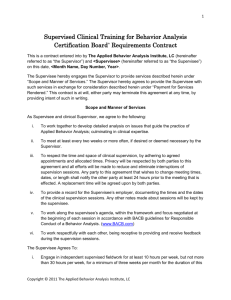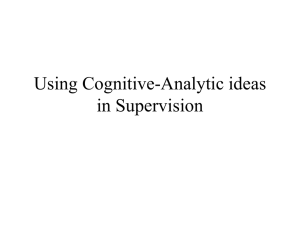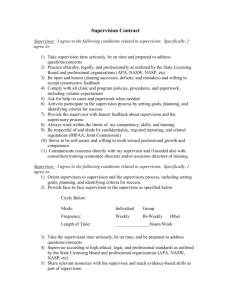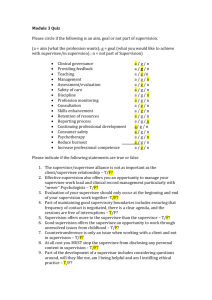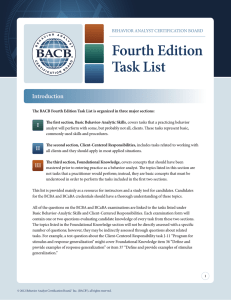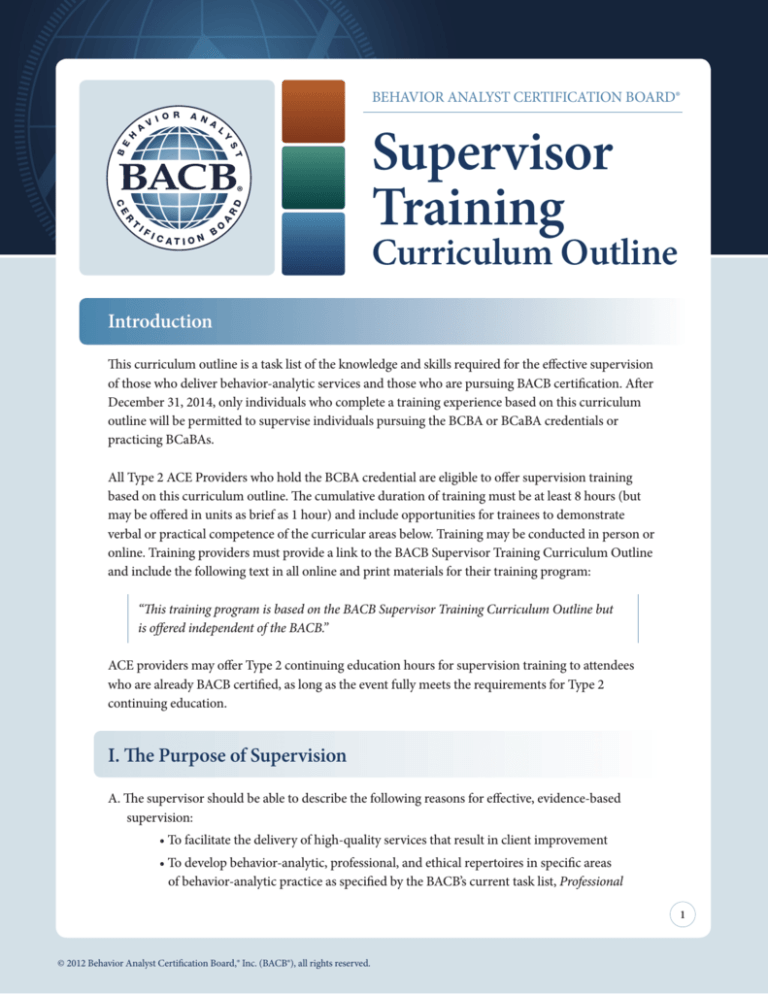
T
®
R
IF
IC
AT I O N
O R
V I
O
B
BEHAVIOR ANALYST CERTIFICATION BOARD®
A N
A
L
T
B
S
E
Y
H
A
A
R
D
CE
T
®
R
IF
A
R
D
CE
T
IC
AT I O N
B
Stefanie Koehler Designs_BACB_113011
O
BACB LOGO VECTOR MASTER FILE
Supervisor
Training
Curriculum Outline
CONTACT :: Stefanie Koehler • stefanie.m.koehler@gmail.com • 604-563-9412 • Vancouver, BC, Canada
Introduction
This curriculum outline is a task list of the knowledge and skills required for the effective supervision
of those who deliver behavior-analytic services and those who are pursuing BACB certification. After
December 31, 2014, only individuals who complete a training experience based on this curriculum
outline will be permitted to supervise individuals pursuing the BCBA or BCaBA credentials or
practicing BCaBAs.
All Type 2 ACE Providers who hold the BCBA credential are eligible to offer supervision training
based on this curriculum outline. The cumulative duration of training must be at least 8 hours (but
may be offered in units as brief as 1 hour) and include opportunities for trainees to demonstrate
verbal or practical competence of the curricular areas below. Training may be conducted in person or
online. Training providers must provide a link to the BACB Supervisor Training Curriculum Outline
and include the following text in all online and print materials for their training program:
“This training program is based on the BACB Supervisor Training Curriculum Outline but
is offered independent of the BACB.”
ACE providers may offer Type 2 continuing education hours for supervision training to attendees
who are already BACB certified, as long as the event fully meets the requirements for Type 2
continuing education.
I. The Purpose of Supervision
A. The supervisor should be able to describe the following reasons for effective, evidence-based
supervision:
• To facilitate the delivery of high-quality services that result in client improvement
• To develop behavior-analytic, professional, and ethical repertoires in specific areas
of behavior-analytic practice as specified by the BACB’s current task list, Professional
1
© 2012 Behavior Analyst Certification Board,® Inc. (BACB®), all rights reserved.
®
R
IF
IC
AT I O N
O R
V I
O
B
A N
A
L
T
B
S
E
Y
H
A
A
R
D
CE
T
®
R
IF
A
R
D
CE
T
IC
AT I O N
B
Stefanie Koehler Designs_BACB_113011
O
BACB LOGO VECTOR MASTER FILE
CONTACT :: Stefanie Koehler • stefanie.m.koehler@gmail.com • 604-563-9412 • Vancouver, BC, Canada
Disciplinary and Ethical Standards, and Guidelines for Responsible Conduct for Behavior
Analysts
• To guide behavioral case conceptualization, problem solving, decision making, and
assistance seeking of the supervisee
• To improve current repertoires of the supervisee
• To maintain beneficial repertoires of the supervisee
• To model effective supervision practices for the supervisee
B. The supervisor should be able to describe the following potential outcomes of ineffective
supervision:
• Low-quality services to clients that result in lack of client progress or harm
• Poor-performing supervisees with insufficient practice repertoires
• Poor-performing supervisees unable to problem solve and make decisions in novel or
unfamiliar situations
• Supervisees who do not become effective supervisors in their own practices
• Supervisees who engage in unethical behavior
II. Important Features of Supervision
The supervisor should be able to describe or demonstrate the following components of effective,
evidence-based supervision:
• Establishment of performance expectations of both supervisor and supervisee
• Description of how supervision will proceed according to the BACB Experience Standards
(e.g., frequency of individual supervision, group supervision)
• Description of potentially appropriate activities as described in the BACB Experience
Standards
• Description of competency tests of understanding
• Development and review of contractual agreement of the nature of supervision and
performance expectations
• Assessment of initial skills of supervisee
-Interview
-Observation
• Behavioral skills training of supervisee
2
®
R
IF
IC
AT I O N
O R
V I
O
B
A N
A
L
T
B
S
E
Y
H
A
A
R
D
CE
T
®
R
IF
A
R
D
CE
T
IC
AT I O N
B
Stefanie Koehler Designs_BACB_113011
O
BACB LOGO VECTOR MASTER FILE
CONTACT :: Stefanie Koehler • stefanie.m.koehler@gmail.com • 604-563-9412 • Vancouver, BC, Canada
• Scheduled observations that may include in-vivo, video, web-based, computer-assisted
observations
- Before, during, and after training
• Review of written materials developed by the supervisee, including written plans, data
sheets, and reports
• Ongoing scheduled supervision meetings
- Individual
- Group
- Web-based, computer assisted
• Performance evaluations (formal & informal) of the supervisee
- Meetings
- Written evaluations
• Evaluation of the supervision process and the supervisor by the supervisee
-Meetings
-Written evaluations
III. Behavioral Skills Training
A. The supervisor should be able to describe and demonstrate the following components of
behavioral skills training of the supervisee:
• Provide a rationale for why the target skills are to be trained
• Provide a succinct, written description (instructions) of the target skills
• Provide a detailed, vocal description (instructions) of the target skills
• Demonstrate (model) each of the target skills
• Require supervisees to practice (rehearse) each target skill
• Provide positive and corrective feedback to supervisee
• Repeat the previous step until supervisee performs each target skill correctly
• Assess application and generalization of skills to new targets, clients, and settings, when
appropriate
B. The supervisor should be able to describe the following formats for providing behavioral skills training:
• In person
-Role-play assessment
-In-vivo assessment
3
®
R
IF
IC
AT I O N
O R
V I
O
B
A N
A
L
T
B
S
E
Y
H
A
A
R
D
CE
T
®
R
IF
A
R
D
CE
T
IC
AT I O N
B
Stefanie Koehler Designs_BACB_113011
O
BACB LOGO VECTOR MASTER FILE
CONTACT :: Stefanie Koehler • stefanie.m.koehler@gmail.com • 604-563-9412 • Vancouver, BC, Canada
• Through visual media such as video, computer, and web-based technologies
-With individual supervisees
-With a group of supervisees
C. The supervisor should be able to apply behavioral skills training across relevant skill areas
including, but not limited to, those outlined in the tasklist. Examples include:
•Fundamental behavior-change procedures
•Specialized procedures
•Data collection and analysis
•Case conceptualization
•Problem solving
•Decision making
•Resource seeking (e.g., facilitating additional consultation, mentorship, collaboration)
IV. Delivering Performance feedback
A. The supervisor should be able to describe and demonstrate the following components of
performance feedback:
•Positive feedback involving contingent, descriptive praise
•Corrective feedback
-Provide an empathy statement
- Describe ineffective performance
-Provide a rationale for desired change in performance
-Provide instructions and demonstration for how to improve designated
performance
-Provide opportunities to practice the desired performance
-Provide immediate feedback
•Follow-up
B. The supervisor should be able to describe the following ways of providing feedback:
•Vocal
•Written
•Modeled
•Video
4
®
R
IF
IC
AT I O N
O R
V I
O
B
A N
A
L
T
B
S
E
Y
H
A
A
R
D
CE
T
®
R
IF
A
R
D
CE
T
IC
AT I O N
B
Stefanie Koehler Designs_BACB_113011
O
BACB LOGO VECTOR MASTER FILE
CONTACT :: Stefanie Koehler • stefanie.m.koehler@gmail.com • 604-563-9412 • Vancouver, BC, Canada
•Graphic
•Self-monitored
•Formal (e.g., in scheduled situations such as pre-arranged meetings)
•Informal (e.g., ongoing, on-the-job)
V. Evaluating the Effects of Supervision
The supervisor should be able to describe methods to evaluate supervisory effectiveness:
•Evaluation of supervision based on client performance
-Objective measures of client behavior addressed by services (e.g., graphic display
of client performance)
-Interviews and direct observations of client and caregiver satisfaction with services
(e.g., social validity / satisfaction questionnaires)
-Matching observations and evaluation methods to the client goals and setting
•Evaluation of supervision based on staff performance
-Objective measures of direct observation of staff behavior addressed in training
and supervision
-Interviews and direct observations of staff satisfaction with training and
supervision
-Matching observations and evaluation to the supervisee’s goals and setting
•Evaluation of supervision fidelity based on evidence-based, intervention specific criteria
for supervisory behavior
- Specification of supervisory performance criteria
-Self-observation of supervisory performance
-Peer observation of supervisory performance
-Mentor observation of supervisory performance
VI. Ongoing Professional Development
A. The supervisor should be able to describe the following methods for his/her ongoing professional
development as a supervisor:
•Creating a continuous learning community to enhance supervisory and training behavior
•Regular review of resources and research for best practices in supervision
• Supervisory study groups
5
®
R
IF
IC
AT I O N
O R
V I
O
B
A N
A
L
T
B
S
E
Y
H
A
A
R
D
CE
T
®
R
IF
A
R
D
CE
T
IC
AT I O N
B
Stefanie Koehler Designs_BACB_113011
O
BACB LOGO VECTOR MASTER FILE
CONTACT :: Stefanie Koehler • stefanie.m.koehler@gmail.com • 604-563-9412 • Vancouver, BC, Canada
•Attending conferences
•Seeking peer review
•Seeking mentorship
•Regular review of resources and research relevant to supervisee’s area of practice
•Seeking consultation when necessary
B. The supervisor should be able to describe the following methods for the ongoing professional
development of the supervisee:
• Creating a continuous learning community to enhance behavior-analytic skills
•Regular review of resources and research for best practices in applied behavior analysis
•Creating study groups and journal clubs
• Attending conferences
•Seeking peer review
•Seeking mentorship
•Seeking consultation when necessary
Copyright © 2012 by the Behavior Analyst Certification Board,® Inc. (“BACB®”), all rights reserved. Unauthorized reproduction, copying, or
transmission in any medium is strictly prohibited.
® The trademarks “Behavior Analyst Certification Board,® Inc.,” “BACB®,” “Board Certified Behavior Analyst®,” “BCBA®,” “Board Certified
Assistant Behavior Analyst®,” and “BCaBA®,” are owned by the Behavior Analyst Certification Board®. Unauthorized use or misrepresentation
is strictly prohibited.
6


